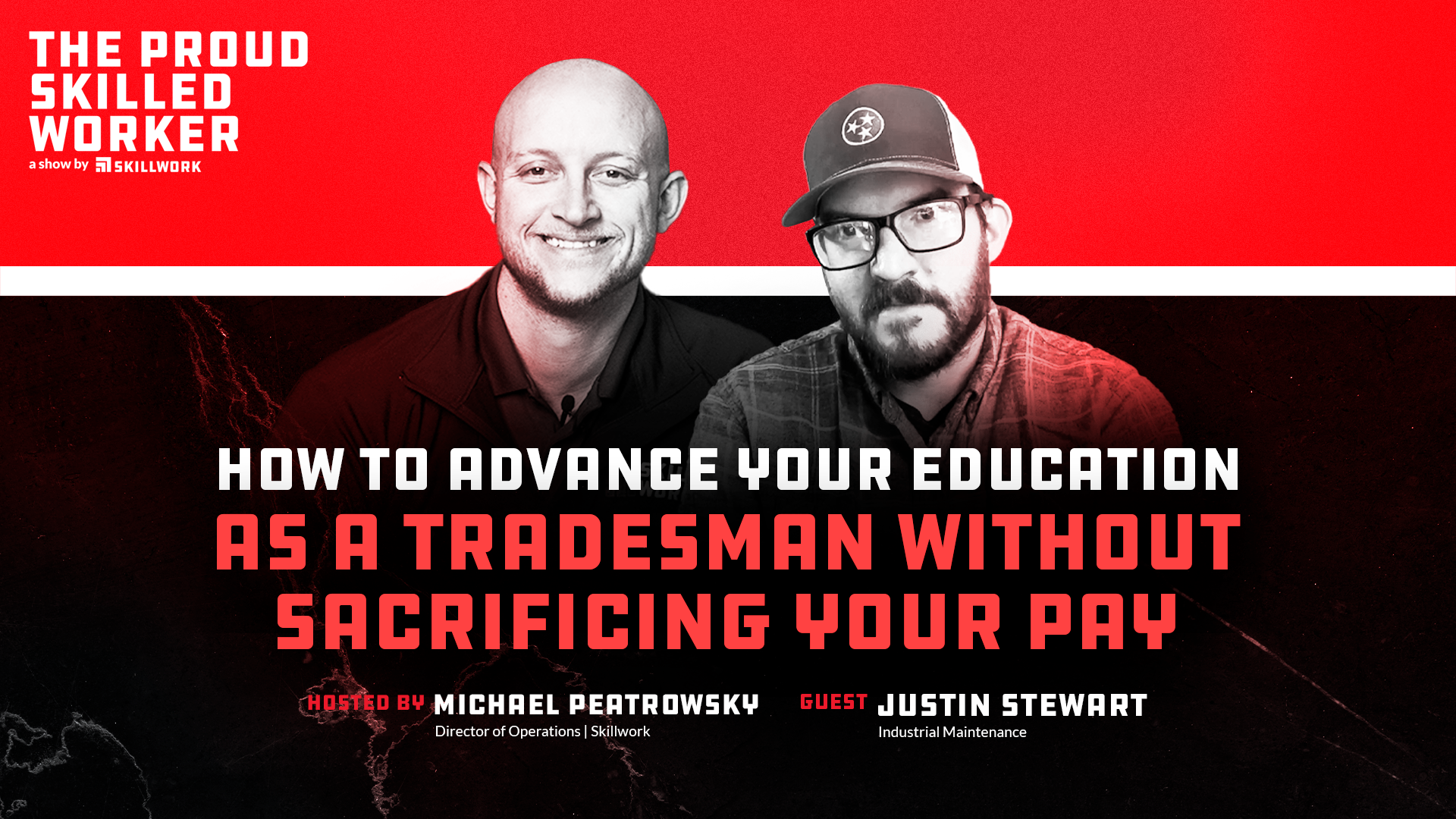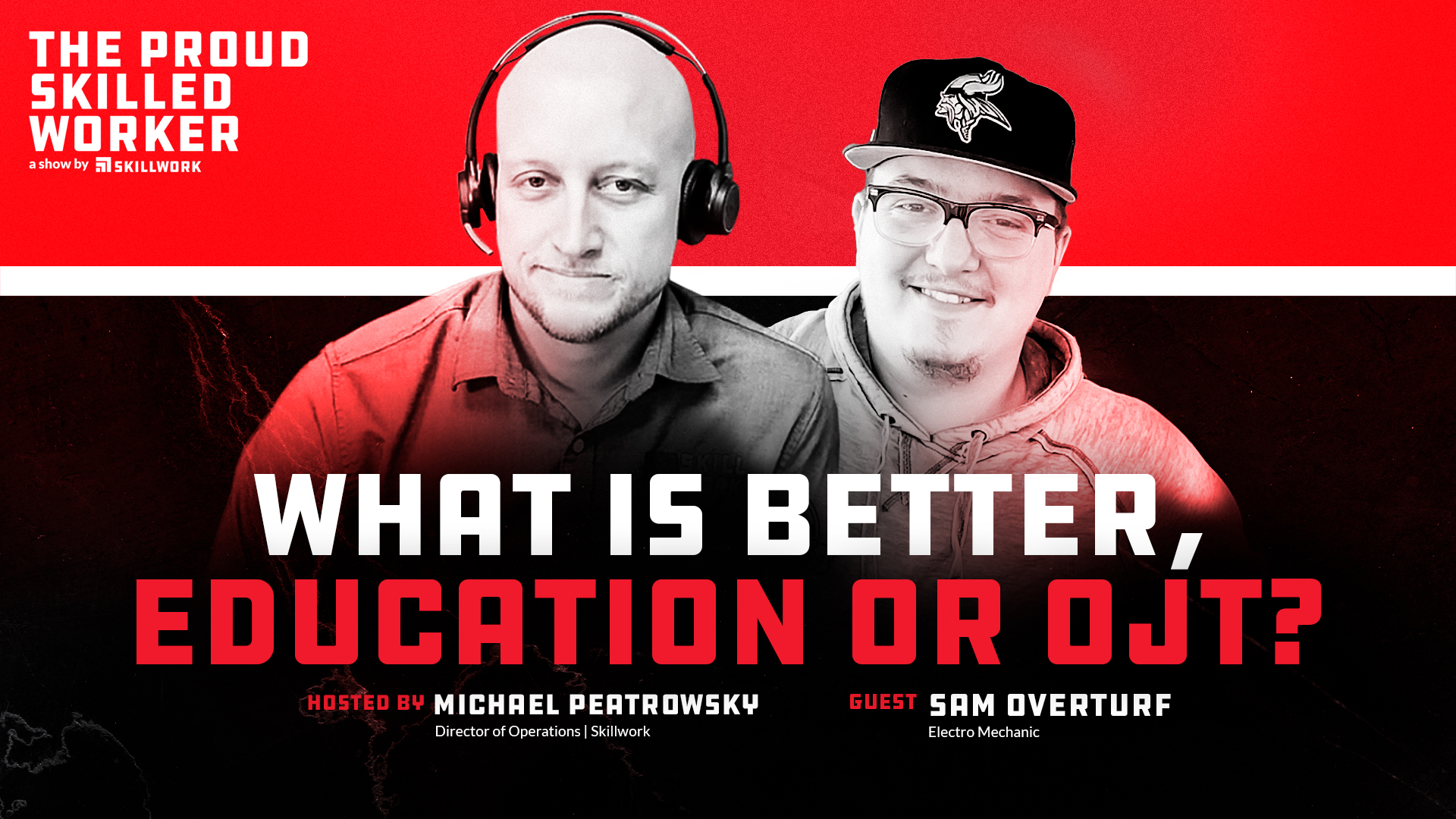How to Succeed on the Road with Skillwork - with Keith Hatcher
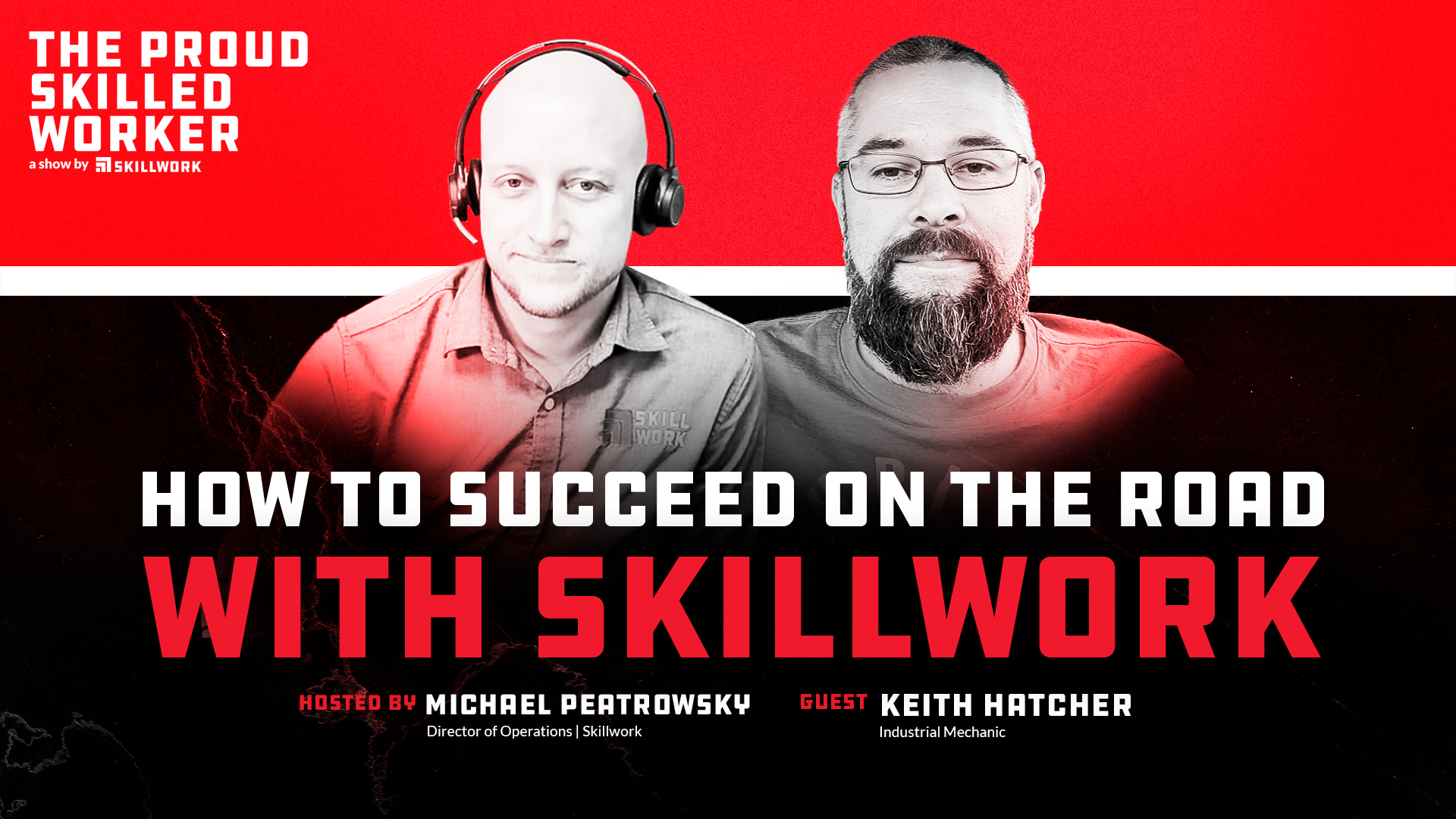
- Skillwork’s website: www.skillwork.com
- Skillwork’s LinkedIn: www.linkedin.com/company/skillwork
- Skillwork’s YouTube channel: www.youtube.com/channel/UCWZSf9KTuKudIm2buVFrhcw
- Rveal’s website: rveal.media
- Rveal’s LinkedIn: https://www.linkedin.com/company/rvealmedia/
- Rveal’s YouTube channel: https://www.youtube.com/channel/UC69p14R2ccMdyUbbmdlWCEw
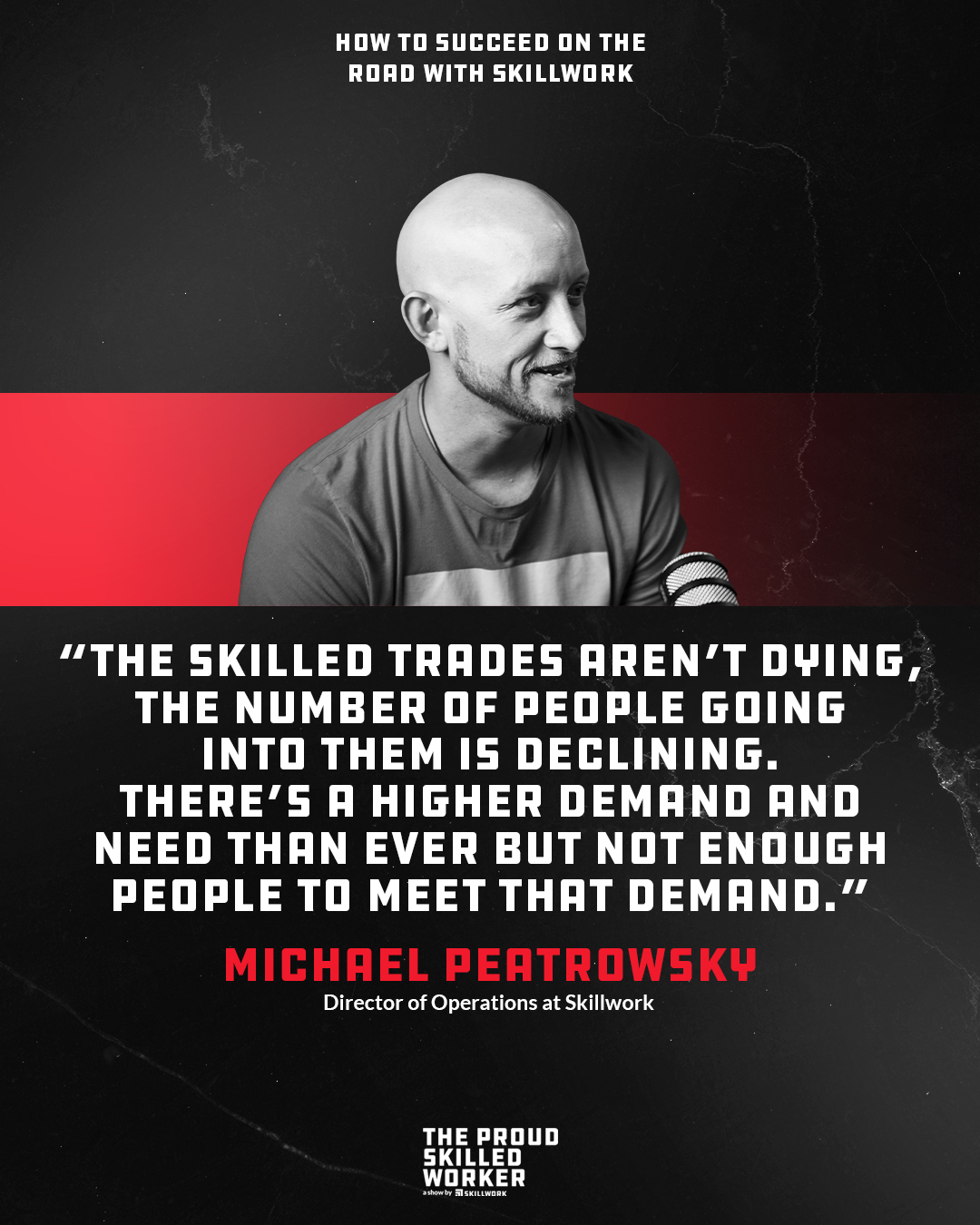
Full Transcription:
"The following was created using a transcription service and may contain errors.”
Michael Peatrowsky 00:13
Hello, everybody and welcome to another episode of The proud skill worker today we have an opportunity to interview Keith Hatcher. He's an industrial mechanic currently working in Massachusetts, Keith, thanks for being on the show, sir.
Keith Hatcher 00:23
Thanks for having me.
Michael Peatrowsky 00:24
Yeah, absolutely. Keith, let's jump in real quick and get a little bit of background on you. How'd you end up in industrial maintenance?
Keith Hatcher 00:30
About 19 years ago, I went and motorcycle repair actually went to MMI to work on motorcycles. And I really want no money in motorcycles. So I had to go to work in a factory. So and if I wanted to work in a factory, I wanted to work on stuff. So I've always worked with my hands and repaired stuff. Ever since I was 15 years old. I've been industrial maintenance for 18 years now going on 19. So it's just, it's a way of life. So once you you know, get into something, you got a knack for it. I like working with my hands. Good.
Michael Peatrowsky 01:04
Good. Tell me a little bit about how MMI the I'm guessing that's a motorcycle maintenance institution. Wild shot that work on an acronym.
Keith Hatcher 01:11
Alright, yeah, motorcycle Mechanics Institute. It's in Orlando, Florida. It's all everything works hand in hand, you know, you got mechanical, electrical you got, I mean, I feel like if you can work on one thing, you can pretty much do whatever you know, long as you can sit there and figure it out what it has to do
Michael Peatrowsky 01:28
and everything. Talk to me a little bit about how those skills transferred when you did end up getting into industrial maintenance.
Keith Hatcher 01:34
Well, I mean, everything I mean, as far as you know, being able to tear stuff apart and figuring out what's wrong with it and repairing it and being able to put it back together reading blueprints, like electrical diagrams, I mean, that's everything that you have to do and industrial maintenance. So and there was actually machinists, you know, work involved in it, you Mike and cylinders, and everything across the board. Everything translates from one to the other. Those are
Michael Peatrowsky 02:03
industries that you don't necessarily expect to have an overlap in. But as you just described it, it's almost feels like they're fully transferable across the board. I wonder if, if that's something people know, who are if they're stuck in an industry or stuck somewhere. So definitely interesting to hear you talk about how transferable all of those small skills you had. Were when you got into industrial maintenance. Yeah, I'd be curious as you've as you've transitioned out of the motorcycle maintenance world and into industrial mechanics, what was the biggest challenge you face faced Keith
Keith Hatcher 02:32
right off the top of my head I can't really think of like huge challenges or anything I mean, long as you get out there and you're willing to learn and you know, put your all into it. They'll always be willing to jump in there and help long as you're a go getter most people's willing to teach you things and show you you know, show you the ropes really interested
Michael Peatrowsky 02:53
Keith, where's home for you?
Keith Hatcher 02:54
Right same Virginia.
Michael Peatrowsky 02:56
Okay. And where are you currently sitting in your truck at
Keith Hatcher 02:59
Northampton, Massachusetts Walmart.
Michael Peatrowsky 03:04
Talk to me a little bit about why you are where you are.
Keith Hatcher 03:08
I don't have real good service where I'm located at I'm actually living in a 39 foot camper. With my daughter just recently come up here with me here in a couple of weeks. My wife's gonna be joining me, hopefully we get to see the country. So
Michael Peatrowsky 03:24
talk to me a little bit about traveling with schoolwork. How that's been for you. It was hesitations you had what the reality of that is. Because I think people get into this traveling mindset thinking one thing and getting a different result. What was your expectation, and then what's your what's been your reality.
Keith Hatcher 03:39
My whole reason for like, basically wanting to join schoolwork and doing the whole traveling thing is the past couple years is me and my wife talked about traveling and hitting the road and everything I was kind of, you know, at a point was my job where I didn't know if I want to keep doing the same thing. Again, it kind of turned into repetitious going in repetition, you know, going into the same place every day, day in and day out. And skill work. You know, you get these contracts, you can go in, you can learn a whole lot. You get to basically see the country and see what other companies have to offer. And you're just constantly learning because you're not seeing the same thing every day. You're constantly moving around everything. And I thought that was really exciting. Plus, with the aspect of me, my wife, my daughter, all of us being able to travel and see the country and meet new people like my daughter, we're going to homeschool or next year. So this is we're looking for this to be a way ally, you fino as far as moving around and everything. So I think it's pretty awesome opportunity.
Michael Peatrowsky 04:46
What was your expectation going in on how the travel would be? Do you think that it was going to be? Did you think it was going to be easier or harder about how this was? I mean, I'm curious to know when you decided to go all in on this what was what was the reality of the X rotation for you,
Keith Hatcher 05:01
I knew it was gonna be a constant learning curve. And I know one gonna be easy every day, you know, I mean, I was looking forward to, you know, it is a challenge and everything that's, that's I was really looking forward to that part of it. And, uh, you know, going in and just learning the equipment and everything and getting to know the people, I didn't have no, like, my expectations of everything was just being able to learn new things and meet new people.
Michael Peatrowsky 05:25
So at this point in the showcase, what we do is we jump into some questions from actually some of our skilled workers in the field, some of the skilled workers across the country who have reached out to us. And the first question actually comes from Ethan. And he asks, Are the skilled trades really dying, and his backside of that is it feels like there's the highest demand ever for skilled labor. So are skilled trades really dying? In your opinion,
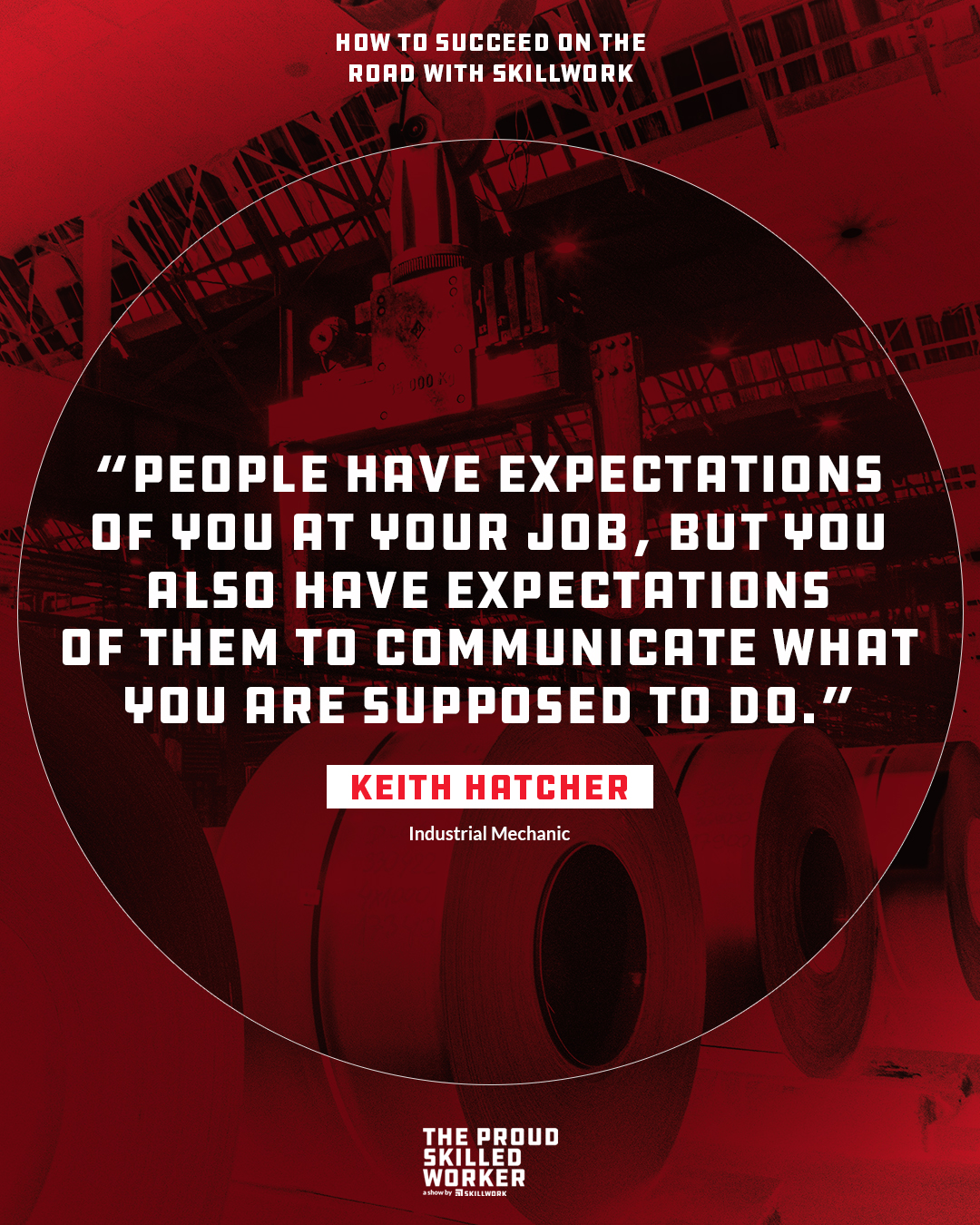
Keith Hatcher 05:45
I don't feel like they're dying. I mean, they can't I mean, their stuffs gonna break, it has to be worked on. And we have to have people to do it. There's a lot of people retiring and getting out of the field and stuff. And I don't feel like it's as many people coming into it, because I feel like a lot of schools nowadays, they really push to four year college. And you know, I know that they have technical trades and stuff. But I don't feel like they're pushing that near as much as a four year college. That's why it kind of feels like it's dying, just because it's not that many people rarely going into it.
Michael Peatrowsky 06:18
It's almost like the skilled trades isn't dying, the number of people going like you just said going into it is dying out like there's a higher than ever need and demand for it. But there's not enough people to reach it. So it's dying, because they're just not able to fill all the open jobs. So it's interesting to look at it from that perspective of skilled trades is here and it will be here forever, as you just said, because things break. But if no one takes these jobs, it's dying, because no one's taking the roles. And I wonder if that's an interpretation that people have on the ground floor?
Keith Hatcher 06:47
Well, I feel like a lot of people don't want to responsibility either. Because like, you know, in manufacturing, a lot of times you can go in and get operator position. And it's not a very big PayScale difference. A lot of people just don't want that extra responsibility of getting to know all the equipment when they could just sit there and operate one piece of machinery all day. You know, they don't have to worry about all the ins and outs of the whole facility and everything. I think a lot of it is, you know, the pay, there's a pay gap. And I don't feel like it's a whole lot lot of difference there.
Michael Peatrowsky 07:21
I think that that brings us kind of really nicely into our next question from from straw y, which asked, Why aren't skilled workers valued as assets more, which as you just said, there seems to be a gap between production operators into the skilled workers operator, the skilled operators. Talk to me a little bit about why you think that they're not why skilled workers aren't valued as assets,
Keith Hatcher 07:43
I was actually told by a boss at a previous job that I could basically train them train anybody to turn a wrench. And that's not saying that not everybody can do it. But it is a knack, you have to have a knack for it. And you have to have the want to learn and everything really shoots people down, especially when you've been in this field for 18 years, somebody tell you that they can train anybody, when you know that that's just it's not the case.
Michael Peatrowsky 08:11
And that's, that's gonna be really hard to hear. Especially because, you know, there's so many people out there who are like you just said, they don't take responsibility for it. So yeah, they have the physical capability to turn a wrench correct. But do they have the want to? Do they have the grind? Do they have the wherewithal to know what to do after they turn that wrench and how to fix the machine? Because, physically, their statement probably holds true? Yes, you can move your arm left to right, you can turn a wrench, but what can you do with that? Do you have the skill set around it to actually do the maintenance? So how do we how do we shift that mindset? Keith, what do we have to do?
Keith Hatcher 08:46
I feel like you need to give, you know, the skilled workers and everybody you know, you got to give them an incentive to want to go out and do it and learn the trade and everything I mean, through training out there to people on it, you know, if they get them into maybe these training programs, and it might spark more of an interest in it and say, hey, look, you know, look at what I did. I'm not just sitting here pushing a button all day, I'm actually making this machine you know, figuring out the ins and outs and making it work to with the capability that you know it can do or whatever you talked
Michael Peatrowsky 09:19
about incentivizing maintenance technicians in the maintenance field. One thing you hit on was training what are what are some other options or some training programs do you think people should be presenting or people should be provided? Well,
Keith Hatcher 09:30
I mean, just like you know, specialty training, like as far as equipment that is in a facility and everything got all these different manufacturer like the actual machines, it's different manufacturers have those companies come in and have seminars and you know, just actual real training, like go out there not just the books but do the hands on like, you know, say bring the tear down, you know, go out and work on tear down together. That way it gets to the ins and outs of the machine and you really get to understand how everything's work and how this works with that, and so on.
Michael Peatrowsky 10:05
It's great. And it ties into, you know, as we continue to try to upskill people and we try to level people up in their careers. There's questions that come into us just like this next one, from George to like, how do you prepare for advancement and industrial maintenance? You just talked about a couple of them being OJT and, and some OEMs, who come in so original equipment manufacturers who come in and give those trainings. But what else I mean, as a actual industrial maintenance role, what's something you can do every day to advance your your career
Keith Hatcher 10:34
show up, show up to work on time, you know, always be willing to jump in there and lend a hand. I mean, even if you don't know exactly what the machines supposed to be doing. That's, I mean, that's how you learn to you know, say you're new at the job or whatever, just jump in there and help be ready to do whatever. Yeah, that's a big thing. I mean, showing up to work and be willing to work.
Michael Peatrowsky 10:56
Why is it? Do you think that that's so difficult nowadays, just that the first part of it that show up to work? I feel like, I feel like you laugh through that just to kind of get get through the pain that you feel in that moment? And why do you feel like it's so hard to get to work?
Keith Hatcher 11:10
I don't feel like it's hard for me. But you know, it just seems like a lot of people just don't want to work anymore. And that's pretty sad, you know, I want to go to work I want to be able to provide for my family. I just got that mentality. And you know, just the work and get it done. A
Michael Peatrowsky 11:27
couple of things you've talked about in the maintenance world, as you just said, is people not showing up and then operators and the gap and maintenance. Hunter S wants to know, what are the what are the two most common flaws in the industrial field that go unaddressed? And why do you think they go unaddressed? I'm curious to know,
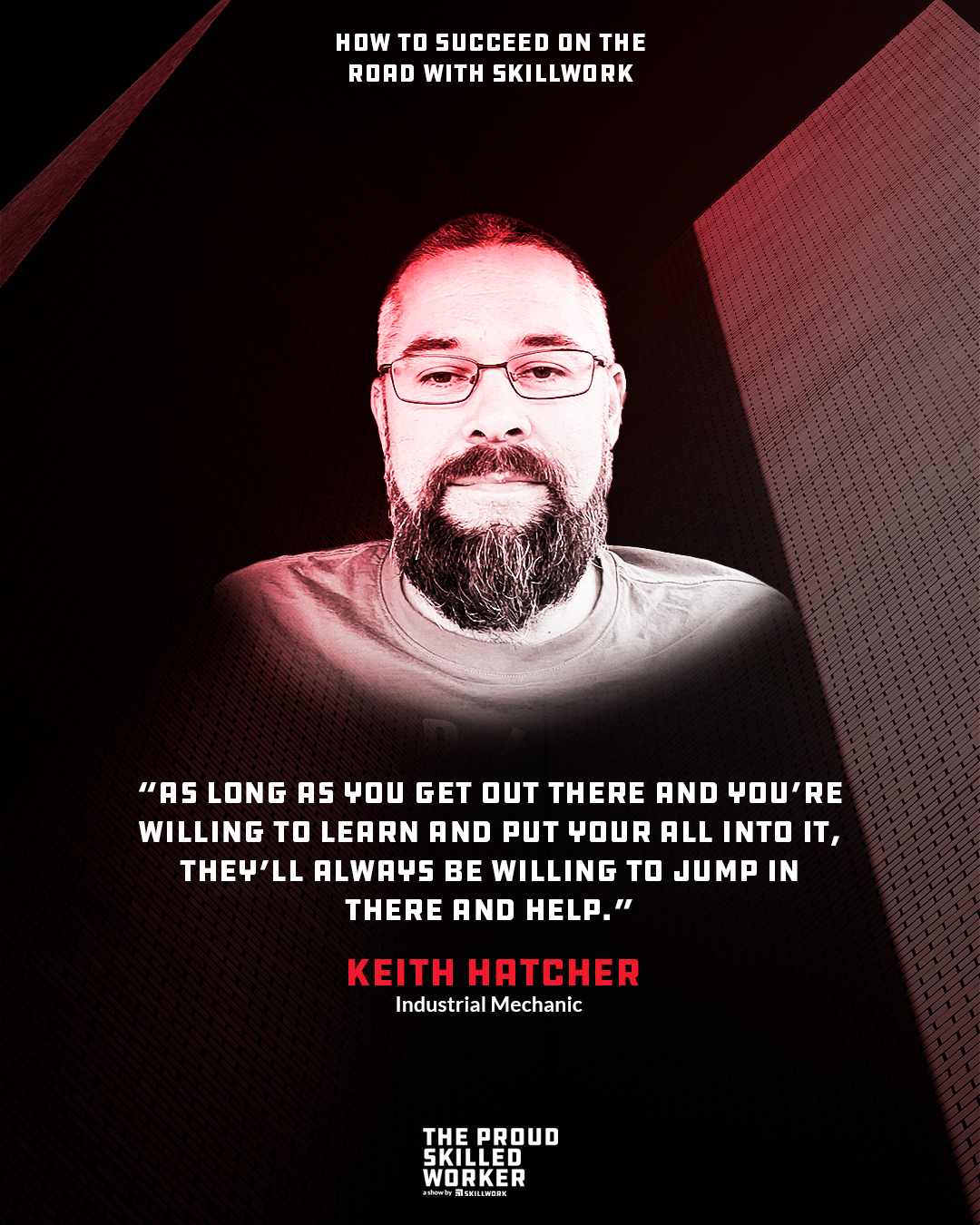
Keith Hatcher 11:43
that goes back to like training and stuff too. But also like, you know, as far as like, I've worked, this was a previous job, but I come in it was me. And another guy, we were on daylight for basically three days. And we got transition to night shift just the both of us not knowing that equipment. Yeah, we both were mechanics 15 and 20 years, but not on this equipment. I mean, we literally it was either sink or swim, you know, we just had to learn the equipment on our own, and just go through trial and error, basically, you know, having no training at all just getting thrown to the wolves.
Michael Peatrowsky 12:19
What do you think that's a reason for like quick shift changes or limited training programs? What do you think? What do you think caused
Keith Hatcher 12:25
that people are not really happy with their jobs, when you come in, and you don't really, you know, no expectations and everything. I mean, people have expectations out of you. But you have expectations out there. I'm also and you know, I think it's a really big thing to you need to be shown basically, this is what we need, you know, this is this is what this is supposed to do. I mean, at least go over this stuff with you a little bit better.
Michael Peatrowsky 12:50
I think that there's a shift and a movement in the in the hiring world across kind of all aspects. So this idea that onboarding is not that important onboarding and training is not that important. But all of us crave and enjoy a structured environment. So on your first day, and your third day and your fourth day, if by the end of your third day, they're just like, alright, well, let's go do your job, goodbye. It feels a lot like you weren't really brought up to speed on time. So I think it's interesting that the the onboarding period and the training periods need to almost be a little bit slower and a little bit more deliberate about actually bringing people into the fold before they release them and throw them to the wolves, as you just said. So I think that's definitely something that funnily enough, people are talking about, I
Keith Hatcher 13:31
feel like a lot of companies also are just looking for a body to fill the position. Because everybody's having problems hiring anybody. And just about every place you see, it's a, you know, just a rotating door constantly, people coming in and going out. I guess that might be the reason. And by the way, I'm not really training that much. But it would make people want to stick around longer if they actually knew what was expected. Oh, everything was supposed to roll.
Michael Peatrowsky 13:56
Keith, I was hoping that you could walk me through and talk to me a little bit about how you went through the onboarding and hiring process here at skill work, because your story is amazing. Well,
Keith Hatcher 14:05
before I even actually applied for skill work, I sat down and I watched alcanza you do videos on your see what everything that Joe had to say. And everything really rang true. You know, as far as with schoolwork and everything. And I actually sat down and talked to my family and I wanted everybody I want everybody's opinion to be involved. And I could just because it's a huge thing to basically up and leave home and everything. And I wanted to know what their thoughts were I want to know all the pros and cons. I got my wife, my daughter and my son, all of us. We sat down and we wrote down everything that we thought was good and everything that we thought was bad. And then we sat down and talked about it. Everybody was on board with it. Everybody except for my son. He was he's 18 and he's ready to do his own thing. I was just ready for a change too. And I think my whole family was everybody's wanting to get out there. and adventure, you know, have an adventure to see the country and everything and my son is coming along. But he's still he's growing up. And he's living life doing everything he wants to do to
Michael Peatrowsky 15:11
keep you said that when you watch some of the videos and when you watch the footage that it resonated with you talk to me a little bit about what you think stood out. I had
Keith Hatcher 15:19
just the whole respect for the skill worker and everything it really I mean, it really says a lot about skill work or skill work also that the CEO actually calls and talks to you. I mean, how often do you get somebody that actually calls and y'all seem genuinely like, yeah, I want to make sure everything is up to par and good. It's super awesome i How much I'll keep in touch with everybody. It makes you feel more appreciated to out in the workforce,
Michael Peatrowsky 15:47
and you gave you definitely are appreciated. You and all of our skilled workers and all of our skilled workers here, internally, every one of us appreciated and valued here at skill work, bye, everybody up and down the corporate ladder. And as you said, the CEO takes time out of his day, every single day to call every new skill worker who comes through the door at this building. Because he wants them to feel how you feel valued, respected, and definitely admired for the things that you guys do for this country and for yourself. All right, Keith. This is the part of the show. And it's my favorite part of the show, where I turn it over to you and it just I gave you 510 minutes, however long you need. If you could say one thing right now to everybody in the industry. So every Industrial Maintenance Mechanic in the industry is going to hear the next, the next few words out of your mouth. What's one thing you would say to all of them that you think would help them grow their careers that you think would make an impact on on the industry as a whole?
Keith Hatcher 16:36
Well, I feel like I go out there, learn as much as you can. Because when you stop learning, that's just that's not good. That's the industrial field. It's constantly evolving, and you got to keep up with everything. And keep on truckin. Take it one punch at a time.
Michael Peatrowsky 16:53
What's your favorite part about Massachusetts so far?
Keith Hatcher 16:55
I don't really know yet. I'm getting ready to perience all that with my family. So my daughter, my daughter's up here with me now and then my wife's gonna be joining me here in a couple of weeks. And I'm hoping that weekend go all around and see what all there has to offer. Head up into Maine and go to New York City. We're going to try to see all the New England states so we can turn it into an adventure.
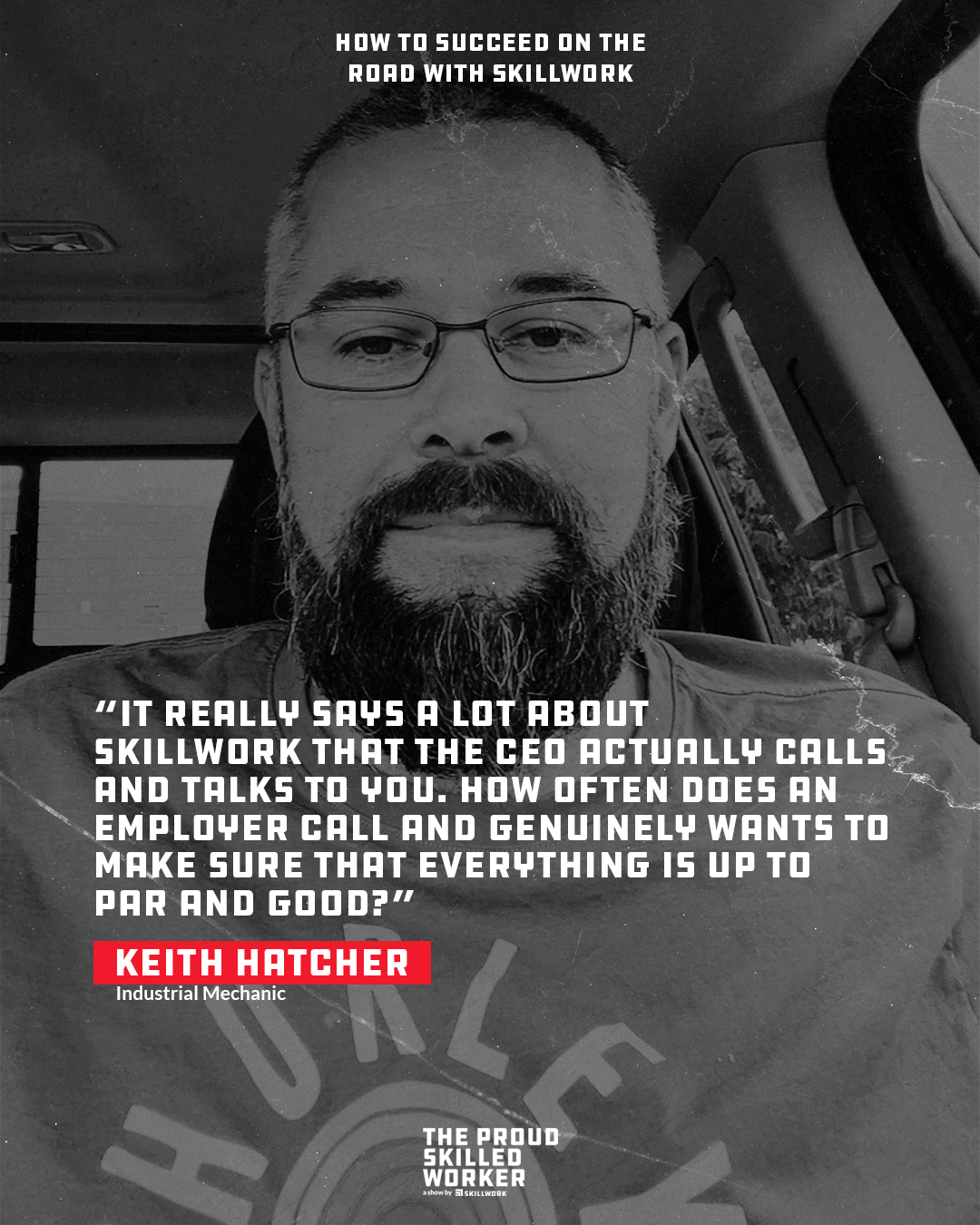 Michael Peatrowsky 17:17
Michael Peatrowsky 17:17
Okay, that's that's the way to do it. Get paid to go somewhere and see everything you can. Yeah. Alright, Keith, thank you so much for being on the on the show with us today. And for those of you watching and listening could please continue to subscribe. Watch us on Spotify, Apple podcast, YouTube, anywhere where you watch your podcast. We put out new episodes every two weeks. We'd love to hear from all of you. Please like comment, subscribe and follow us. Thank you all
